“The RA Anti-Corruption Strategy under International Experience”։ the Two-Day International Anti-Corruption Conference took place
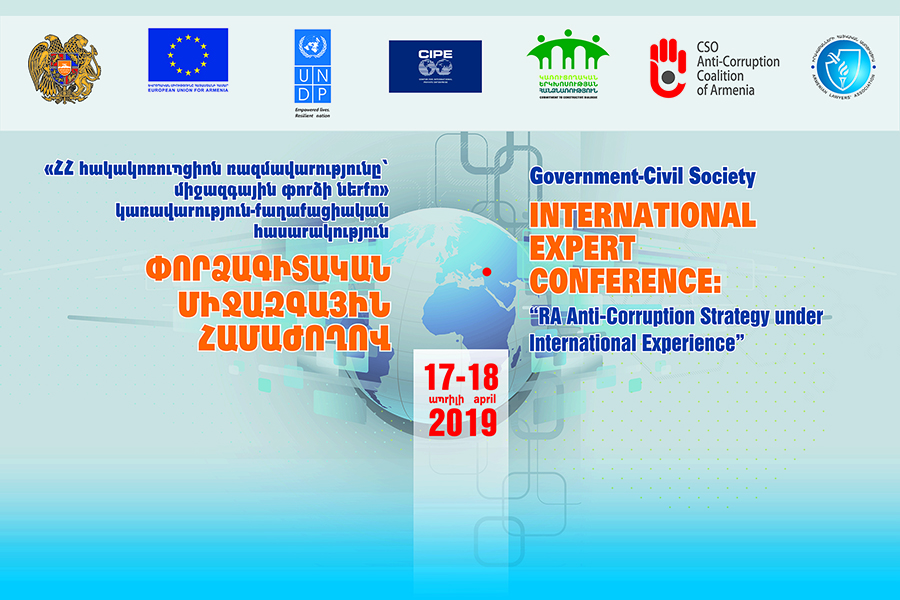
On April 17 and 18, the Government-Civil Society International Expert Conference: “RA Anti-Corruption Strategy under International Experience” was held in Yerevan.
The Conference was organised by jointly by the Armenian Lawyers’ Association, the CSO Anti-Corruption Coalition of Armenia and the Ministry of Justice of the Republic of Armenia, in the framework of the “Commitment to Constructive Dialogue” project supported by the European Union, and in collaboration with United Nations Development Programme (UNDP) and the Centre for International Private Enterprises (CIPE).
H.E. Piotr Antoni Świtalski, Ambassador, Head of the European Union Delegation to Armenia, in his welcoming speech noted that there are visible results in Armenia in the fight against corruption, for which he congratulates. “For people like me, Armenia is another country today than it was a year ago. This is something that you can be proud of, and not just the government, because in my opinion, all Armenians have dreamt about it. However, as some cases related with the officials show, corruption risks are enduring. So be ready for a long struggle. The European Union is always ready to assist Armenia,” Piotr Świtalski said.
Mr. Tigran Khachikyan, Deputy Justice Minister on behalf of the Minister Artak Zeynalyan, thanked the partner organisations for the organisation of the conference and the participants of the event for their contribute to the elaboration and implementation of anti-corruption policy. “As you have seen, the determination to eradicate corruption is clearly reflected in the Government’s programme and it is important to combine strategic and institutional steps in combating corruption in a coordinated way, In the context of the above-mentioned, I attach great importance to the organisation and implementation of such conferences, as this is an additional platform to listen to the proposals and concerns of civil society, the experience of international experts and the opinions of the state bodies,” Tigran Khachikyan said.
He also touched upon the critical significance of the event and noted that it would consist of discussions on key components in the fight against corruption, in particular the mechanisms for restoring stolen assets, whistleblowing system, preventive activities in the fight against corruption and anti-corruption education.
Mr. Artur Davtyan, the RA Prosecutor General, mentioned in his speech that the results of the criminal-justice fight against corruption in Armenia were unprecedented in the history of the Third Republic of Armenia. “It is difficult to overestimate the significance of the conference, which is conditioned by the fact that in the government-civil society format, with the involvement of international experts, with the involvement of international experts, the priorities of the strategically important anti-corruption strategy of the Republic of Armenia are discussed as a cornerstone for the development of a social, legal and democratic country to make the fight against that evil more effective. The law enforcement system and, in particular, the RA Prosecutor’s Office have a primary role and mission here,” the Prosecutor General said.
He noted that the number of the materials on corruption crimes in the proceedings of the RA competent bodies in 2018 had increase for almost four fold as compared with 2017, and the number of initiated criminal cases for 3.6 times. The number of persons prosecuted for alleged corruption cases is by 60 presents more than compared with 2017. Almost as many more were the number of officials had been prosecuted.
“In 2018, 7 criminal cases have been initiated against money laundering. This is in the case in 2017 no criminal cases have been filed with that criminal offense. And after the criminalization of illicit enrichment in the past year, criminal prosecution has been instigated against five persons on the basis of that crime.
In 2018, the property damages caused to the state by corruption which were revealed only by materials prepared and investigated in the course of criminal proceedings exceeds the results of 2017 for 12 times, and the recovery from the total damages caused exceeds for 15 times,” the Prosecutor General said.
Mr. Dmitry Mariyasin, Resident Representative, UNDP Armenia, welcomed the organisation of such an event where experts with extensive expertise are able to share their experiences.
“Nowadays, it is necessary to move from mediocrity to prospective mentality in Armenia related to what the anti-corruption strategy should be, what kind of institutional structures should be, and what changes in the society should take place so that corruption would decrease. We do not say ‘eradicate’, because there is no country in the world where corruptions has been eradicated,” he said.
Mr. Karen Zadoyan, President of the Armenian Lawyers Association, on behalf of the organisers of the conference, thanked the guests from different countries for participation in the event. “The event is really important as the anti-corruption strategy will be discussed. We have important issues related to institutional anti-corruption, return of the assets, anti-corruption education, corruption prevention and law enforcement activities,” Karen Zadoyan said.
Presentation of the RA Anti-Corruption Strategy
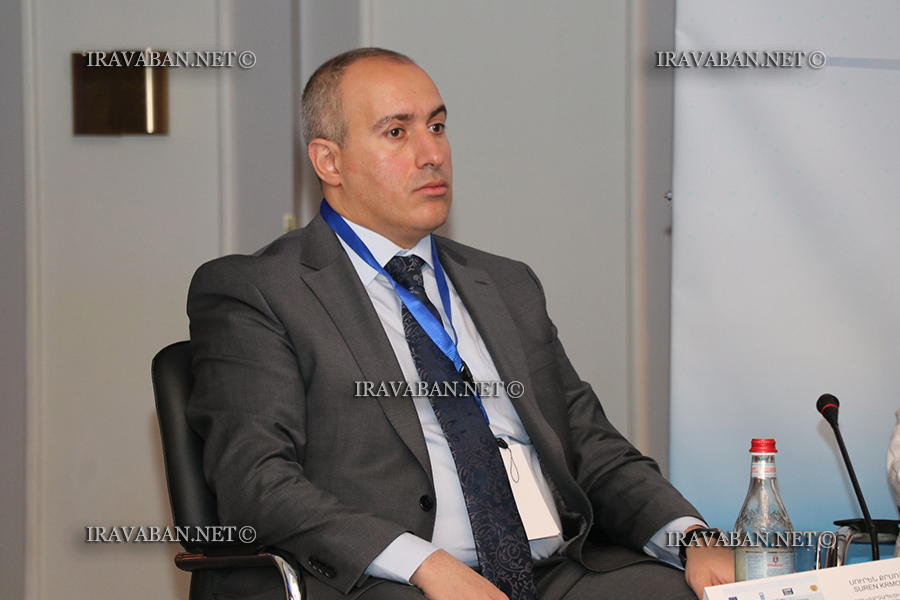
Mr. Suren Krmoyan, Adviser to Deputy Prime Minister was the moderator of the first discussion of the Conference. “The development of anti-corruption strategies is a fairly well-grounded process in the world. There are books written about this and analyses at the academic level had been conducted. Armenia also has its experience in this area. It is very important that this process be participatory,” Suren Krmoyan said in his speech.
Ms Mariam Galstyan, Head of Anti-Corruption Policy Development Department of the RA Ministry of Justice presented the RA Anti-Corruption Strategy and its Implementation Action Plan 2019-22. She mentioned that the Ministry had received more than 300 proposals, most of which have been made by non-governmental organisations. “We will have classic anti-corruption measures in the context of the government program: the overall content of anti-corruption policy; then we will focus on the prevention of corruption; the investigation of corruption cases; public awareness and anti-corruption education,” Mariam Galstyan said. She also added that based on the suggestions and recommendations, the text section of the draft would address more specific issues and will outline the gaps in the previous strategy.
Mr. Anga Timilsina, UNDP’s Global Programme Adviser on Anti-Corruption, UNDP Singapore Global Centre, first introduced, why in general the anti-corruption strategy is needed. He noted that their centre is currently investigating anti-corruption strategies and bodies.
“UNDP has more than two decades of experience in national anti-corruption strategies and bodies. Our first publication was in 2005, in which we viewed 17 models in the world, and this is even before the UN Convention against Corruption. Every year a new kind of corruption is emerging, and we need to be smart, to understand what works, and what does not work,” Anga Timilsina said.
Mr. Karen Zadoyan, “Commitment to Constructive Dialogue” Project Manager, President of the Armenian Lawyers Association, presented lessons learned during the development process of the anti-corruption strategy. He noted that even if strong documents are presented, but they are not implemented, the public expectations are not fulfilled, and some time after the strategy deadlines are over, there is a need for a new strategy and new actions are being developed, whereas the previous ones are not fulfilled: “It is very important that the current process is under way with public involvement and expert debates, unlike the previous one when the government adopted the concept and only then most of the civil society learned about it, and we made a statement with the Freedom of Information Centre. This time it is good that before the draft was posted on the e-draft, it was discussed with civil society organisations, and further the period of the discussions was in the e-draft extended, and now we have a great opportunity, namely this discussion, to influence decisions,” Karen Zadoyan said.
Ms Sona Ayvazyan, the Executive Director of Transparency International Anti-Corruption Centre pointed out the priorities of the anti-corruption strategy. She mentioned that the revolution which took place in the previous year was the culmination of the people’s dissatisfaction resulting from the corrupt system. “It shows that the three strategy documents and their implementation since 2013 did not make any positive changes and the seizing state power, tolerance towards corruption, impunity, and social injustice at some point was just the last straw for the public and they took this step. The revolution itself gives an assessment of the efforts of the Armenian government in the fight against corruption, which, in essence, was the absence of political will,” Sona Ayvazyan said.
Independent Institutional Anti-Corruption System

The 2nd discussion of the conference was on the independent institutional anti-corruption system. Ms Lusine Nalbandyan, Lawyer-Expert, CSO Anti-Corruption Coalition of Armenia was the moderator of the discussion. “Since the international cooperation is one of the priority directions of the fight against corruption, today we have a unique opportunity to use the potential and expertise of international and local experts to understand what model of an independent institutional anti-corruption system is applicable in Armenia,” Lusine Nalbandyan said.
Mr. Suren Krmoyan, Adviser to Deputy Prime Minister presented the challenges for forming an independent institutional anti-corruption system in Armenia. According to him, currently, the most important question is whether we need an anti-corruption body, as actually there are Western countries that do not have such a body, but in contrast, they have better indicators in the fight against corruption than Armenia. “In my opinion, we need that body, because our indicators in the fight against corruption, unfortunately, are not so good. We hope that as a result of the choice of reforms in the democratic situation, we have an opportunity of the open window for us to carry out a coordinated fight against corruption and we should apply it in the context of the creation of the body,” Suren Krmoyan said, pointing out that there is no model of a body that would fit Armenia and it should be built on the basis of local experience. According to him, the main three features for the creation of the body are: policy development and corruption prevention, education and awareness, the functions of law enforcement agencies, through criminal justice methods.
Ms Aida Arutyunova, Programme Manager of UNDP’s Global Anti-Corruption Initiative, UNDP Singapore Global Centre, presented the global experience of the independence and effectiveness of anti-corruption bodies, particularly the experience of Singapore, South Korea and Hong Kong.
“We have this beautiful comparison of Singapore’s past and present. These countries have become developed countries from developing countries during 30-40 years. The following five factors have been added to this transition: strong political will; effective laws, law enforcement and independent judicial systems; merit-based public service; an independent and effective anti-corruption body, public zero tolerance towards corruption,” Aida Arutyunova said.
Mr. Karen Zadoyan, “Commitment to Constructive Dialogue” Project Manager, President of the Armenian Lawyers Association, presented the comprehensive approach for the formation of the preferable institutional anti-corruption system for Armenia. According to him, years ago, when there was no talk about the anti-corruption body in Armenia, and the ALA began to voice the need to have a specialized body, those who voiced the topic were viewed as aliens. Karen Zadoyan mentioned that during the rule of the former authorities, a study was carried out by the working group created by the Minister of Justice, which included state and civil society actors. “The problem is not just the creation of the body, it’s a complete problem and we have to look systematically and comprehensively, because if we talk about the law enforcement wing (having the authority of preliminary investigation and investigation), we have to have a whole picture of that. We have to have a specialized prosecutorial subdivision, which can carry out prosecutorial supervision and we must have a specialized court that will be able to complete the work,” Karen Zadoyan said.
Mr. Khachik Harutyunyan, Anti-Corruption Expert of the Transparency International Anti-Corruption Centre, presented the challenges for selecting and implementing the institutional anti-corruption model in Armenia. “Armenia today has a total of 4 challenges in the fight against corruption. First of all, it is the return of assets, second – the implementation of criminal justice against former corrupt officials, and third – the introduction of such mechanisms in the current political context to mitigate, control, and minimize corruption to possible extent. And fourth, to create a culture of intolerance towards corruption,” Khachik Harutyunyan said.
Law Enforcement Activities in the Fight against Corruption
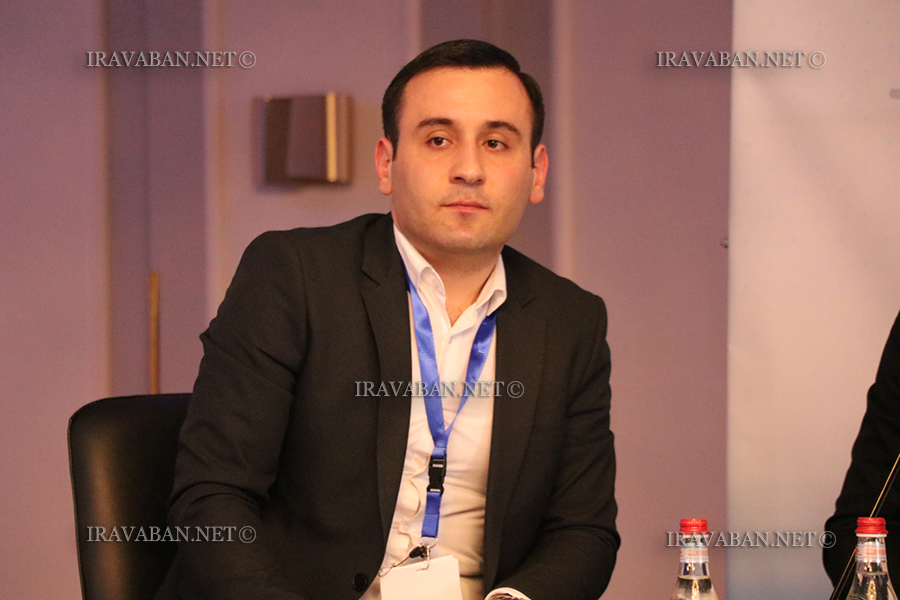
Mr. Artyom Mesropyan Lawyer-Expert of the Armenian Lawyers’ Association was the moderator of the third discussion of the conference, related to the Law Enforcement Activities in Fight against Corruption. “In the previous two discussions, some of the issues were related to the return of assets. It was highlighted that these mechanisms should be introduced and the state should take active steps in this direction,” Artyom Mesropyan said summarising the previous discussions.
Mr. Hayk Movsisyan, Deputy Head of the Department for Protection of State Interests, of the RA Prosecutor General’s Office, presented the importance of the return of assets for Armenia as well as the actions undertaken by Armenia in that direction. “On the way to boosting economic achievements in the Republic of Armenia, the return of the money looted from the Republic of Armenia, to its lawful owner to the people of Armenia has a very significant importance. The return of stolen assets, especially in corruption cases, can have a significant impact on the country’s development, as restored funds can be invested in the provision of vital social services and programs, promoting a significant reduction in poverty and unemployment, ongoing growth of salaries and pensions, export pace rising and so on,” Hayk Movsisyan said.
Mr. Shervin Majlessi, Deputy Coordinator, World Bank/UNODC Stolen Asset Recovery Initiative (STAR), presented the international experience and tools for asset recovery. “I would like to concentrate on three issues related to asset-backed. The first where we are in this area globally, and second, focus on the return of assets, and third, since the anti-corruption strategy is being worked out, we need to address challenges and solutions to make clearer recommendations,” he said.
Ms Syuzanna Soghomonyan, Anti-Corruption Expert of the Armenian Lawyers Association, presented the process of return of assets in the context of anti-corruption strategy. “The 4th Draft Anti-Corruption Strategy already provides relevant interventions for the recovery and confiscation of assets. There are two of them. The first concerns the development of international cooperation, directed to recovery and confiscation of assets, and second, compliance of the RA legislation with the UN Anti- Corruption Convention and international experience in recovery and confiscation of assets. I think that it is important to envisage these measures within the framework of the strategy, but they are quite broad,” Syuzanna Soghomonyan said. According to her, there would be problems with registering the results in the future, and some key and urgent measures should be found in the strategy. One of them is the creation of an asset recovery office in Armenia as there is no body that will engage in asset recovery.
Mr. Hayk Martirosyan, Legal Expert of Transparency International Anti-Corruption Centre presented the challenges of asset recovery in Armenia. He noted that the public expectations and perceptions associated with the institute of asset recovery do not necessarily lead to the return of assets. The expectations of the society lead to the fact that this process is transparent and does not lead to additional corruption risks, and doubts among the public. “It must be observed that the institute of asset recovery is not just a legal institution, it also has an economic and political component that requires a deeper study and should be addressed in this respect from each aspect. Diminution or neglect of the role of each component in the whole process can lead to failure of the case,” Hayk Martirosyan said.
Preventive Activities and Law Enforcement in Fight against Corruption
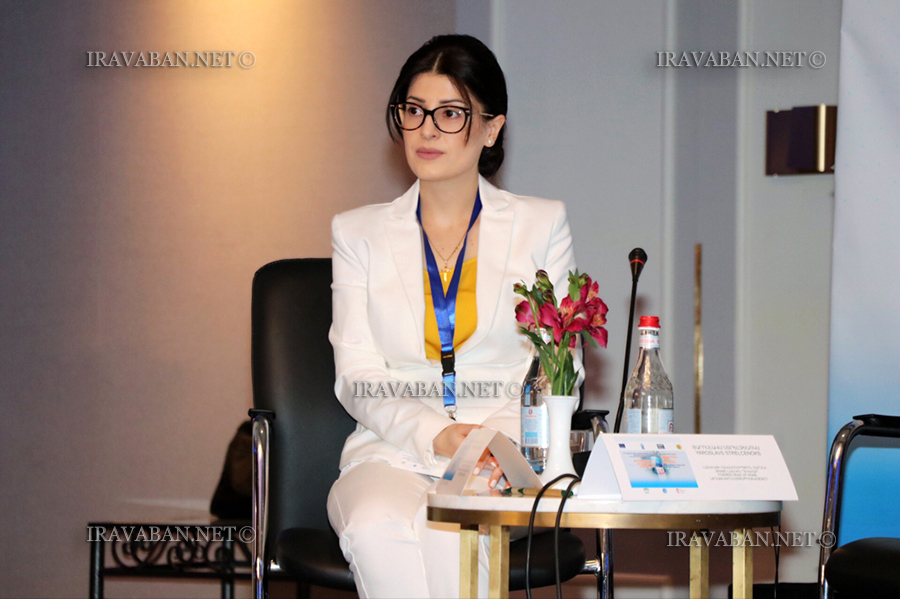
Ms Syuzanna Soghomonyan, Anti-Corruption Expert of the Armenian Lawyers Association, facilitated the 4th discussion on the Prevention of Corruption Risks emerging in the Public Sector and Whistle-Blowing on Corruption Crimes.
Mr. Yaroslavs Strelcenoks, Former Head of KNAB, Latvian Anti-Corruption Agency, spoke about spoke prevention of corruption in the public sector and the role of anti-corruption agencies. “There is distrust between the government and society, and officials then start demanding money from the public in the form of taxes. But if there is no confidence, the society says that they are thieves, and the money is not used by purpose.”
Mr. Edgar Shatiryan, Member of the Commission on Ethics of High-Ranking Officials of the Republic of Armenia spoke about the prevention of corruption in public service. According to Edgar Shatiryan, there are many bodies, including non-institutional, in the area of corruption prevention. He focused on the Corruption Preventive Committee. “The body about which the law was adopted two years ago, a body that would have to be formed in accordance with the same law until late spring or the end of spring in 2018, a body that has not yet been formed for a number of objective and subjective reasons, perhaps the main reason was the political changes that took place in the spring of 2018. We have what we have,” he said. Edgar Shatiryan also mentioned the status of the Corruption Preventive Committee in the system of state authorities.
Mr. Emin Yeritsyan, President of the Union of Communities of Armenia presented the topic of prevention of corruption in local self-governing bodies. He said that the challenges associated with corruption prevention are doubled for local self-governance bodies. “Related to the local authorities as a public institution, there are some stereotypes rooted in the society as a result of targeted political processes in the connection of its perception related to widespread corruption in the local government bodies. This is really a challenge for the public. Imagine selected officials or community servants showing conscientious behaviour who act in this environment, or people who would like to run for the upcoming elections, but the public perception is as follows: Will they want to be elected or to work?” Emin Yeritsyan said, noting that it is a serious challenge.
Ms Arpine Sargsyan, Acting Head of Penitentiary Policy Development Division of the RA Ministry of Justice spoke about the whistleblowing system in Armenia. Arpine Sargsyan emphasized the fact that it is now difficult to overestimate the role and importance of the whistleblowers’ institute. Different discussions related to the expediency to introduce it and on a number of other issues took place. “We first provided a clear definition of the concept “whistleblowing” in the scope of the law, providing it as informing the competent authority about the damage directed to public interest, related to the declaration of corruption in state, local government, public agencies and organisations, within the framework of which the competent authority will assume a specific responsibility for the disclosure of those cases,” she said, presenting a number of other regulations provided by law.
Preventive Activities in Fight against Corruption
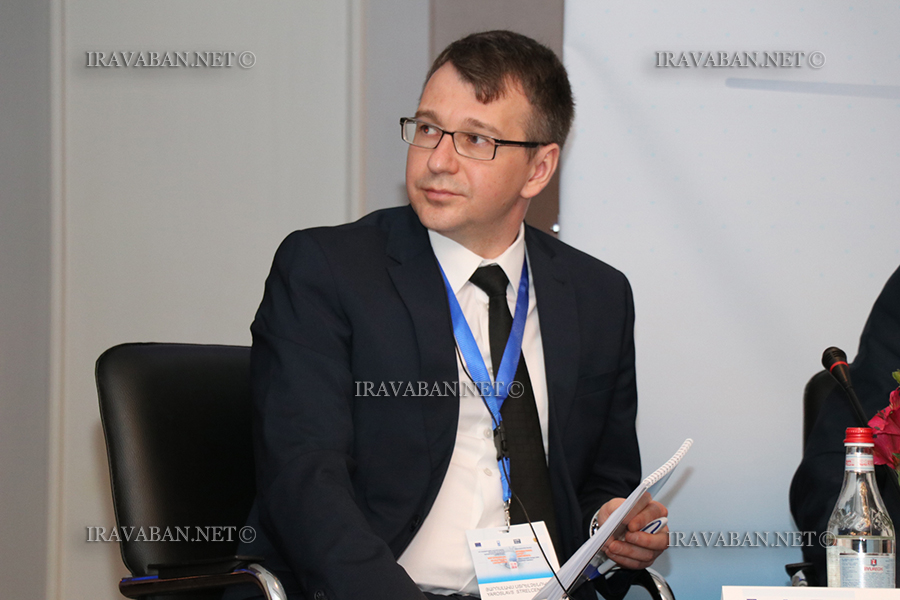
On the second day of the conference Mr. Yaroslavs Strelcenoks, Former Head of KNAB, Latvian Anti-Corruption Agency, facilitated the 5th discussion on Prevention of Corruption Risks Emerging in the Private Sector.
Mr. Arkadi Sahakyan, Chairman of the Governing Board of the CSO Anti-Corruption Coalition of Armenia presented the challenges and prospects of the protection of the economic competition system in Armenia, as well as the corruption risks existing in that system.
“When a business requires fair competition, first of all it expects, whether we have an adequate independent body that will foster effective competition in ensuring free competition. Our studies in our country have shown that there is still no tools available. The world experience shows that the economic competition authorities have a screening system that allows analysing risks and starting a fight. The other experience is to have a union for the protection of interests that can create filters and ensure transparency,” Arkady Sahakyan said. He particularly underlined that there are many issues related to public procurement.
Mr. David Bloss, Organised Crime and Corruption Reporting Project (OCCRP-Caucasus), Regional Editor presented the role of investigative journalism in the prevention of corruption. “It’s difficult to define corruption even in the United States: which a group of country thinks is corruption, and another group considers it as international business. I think it is important to understand that each country will determine what corruption is, which is money laundering and what acceptable business is. The reason we write about these stories is that the government and society make that decision, is not our job to say what is good, and what is bad,” David Bloss said.
Ms Lilia Shushanyan, the Deputy Minister of Territorial Administration and Development of the Republic of Armenia, presented the EITI (Extractive Industries Transparency Initiative) as a tool for raising transparency in Armenia’s mining industry. “Why do we pay great attention to the mining industry today? Because, perhaps in contrast to other economic activities it has a peculiarity – natural resources, with which the business community deals, is the exclusive property of the state. By applying the right to freedom of information and other reasons our citizens and why not state officials at least have the right to be fully informed about what is happening in this sphere,” Lilia Shushanyan said.
Ms Mariam Zadoyan, Anti-Corruption Expert at the CSO Anti-Corruption Coalition of Armenia, Project Manager of the ALA’s Component of “Armenia: Promoting Anti-Corruption Conduct and Reforms” project presented the Institute of Beneficial Ownership, Anti-Corruption Compliance Programmes and Corruption Prevention in Public Procurement. “Under our law, both the legal persons and natural persons may establish a “legal entity”. Recently, legal entities are often used for the purpose of money laundering and other corrupt practices. That is why the institute of beneficial owners has been created, these are the ultimate physical persons who stand behind the company and possess real profits,” she said.
Mariam Zadoyan, referring to the Anti-Corruption Compliance Program, mentioned that it is the company’s acceptable values, relationships, style of action and corporate culture, according to which the company should be guided when carrying out its activity until achieving the final result.
Anti-Corruption Education
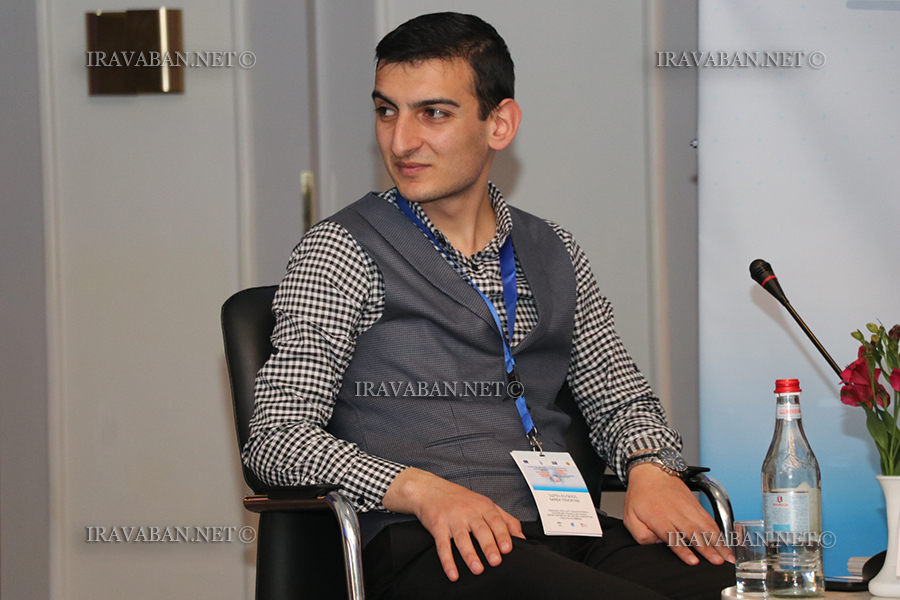
Mr. Narek Yenokyan, lawyer-expert at the CSO Anti-Corruption Coalition of Armenia, facilitated the 6th discussion on Anti-Corruption Education among the Citizens and Public Servants. “Anti-corruption education is one of the three key pillars of anti-corruption struggle and does not yield to the other two, law enforcement and preventive activities. Anti-corruption education is widespread in almost all countries, where institutional fight against corruption is carried out,” Narek Yenokyan said.
Mr. Alex Petkov, Anti-Corruption Education Expert, UNODC Anti-Corruption Academic Initiative (ACAD), presented the best international experience on the topic. “There is a tendency that many countries recognize anti-corruption education as an effective tool to combat corruption. According to Article 13 of the UN Convention against Corruption, Member States should “undertaking public information activities that contribute to non-tolerance of corruption, as well as public education programmes, including school and university curricula,” Alex Petkov said.
Mr. Marat Atovmyan, anti-corruption expert at the Armenian Lawyers’ Association, spoke about anti-corruption education among citizens and the general population. He noted that anti-corruption education is multidimensional and starts from the kindergarten. “The objective of anti-corruption education is to formulate a general understanding of the nature of corruption, its impacts, causes, and harmful effects. It is not right to concentrate only on the topic of corruption in anti-corruption education because it will not form the whole picture of corruption prevention, combating corruption is one of the components of integrity. It would be right to dedicate anti-corruption education not only to topics related to corruption, but also to principles of integrity and good governance,” he said.
Ms Narine Sargsyan, President of “Future is Yours” NGO, spoke about anti-corruption education among youth. “In 2006, when people were heard about the need to conduct anti-corruption education, many school principals and other educational institutions did not even want to listen about it. We were more tactful and in 2006, with the support of the American Embassy, we implemented a plan and set a goal to sow democracy values. When we presented this to the school principals, they did not realize that by saying democracy, we should try to deny corruption and present the process of prevention to the pupils,” Narine Sargsyan said, noting the difficulties of the past years.
Mr. Ashot Hayrapetyan, Director of “Legal Education and Rehabilitation Programme Implementation Centre” SNCO, presenting the providers of public and community services, as well as anti-corruption education among law enforcement and judicial servants, said that if anti-corruption education is conducted from schools and the pupils would grow up more educated in this direction, the further work with them would will be much easier. “Previously, issues related to anti-corruption education were included in civilian re-training programs, and in 2012, with a donor’s funding, a separate program was launched in the Civil Service, which was entitled “Fight against Corruption.” The key topics included in the program were: the concept of corruption and the background of its origin, the corruption types, corruption prevention measures, international cooperation in combating corruption, and relevant acts, corruption risks in public service, socio-psychological basics of corruption, and ethics of public servants,” Ashot Hayrapetyan said.
Simultaneous Panel Discussions and Summary of Recommendations on 3 Topics
After 6 different discussions that were held during the Anti-Corruption Conference, the participants held 3 simultaneous expert consultations, during which recommendations were collected.
-
Anti-Corruption Strategy and Recommendations
Ms Mariam Galstyan, Head of Anti-Corruption Policy Development Department of the RA Ministry of Justice, and Mr. Anga Timilsina, UNDP’s Global Programme Adviser on Anti-Corruption, UNDP Singapore Global Centre, and Mr. Khachik Harutyunyan, Anti-Corruption Expert of the Transparency International Anti-Corruption Centre, conducted rhe discussion on the anti-corruption strategy. It covered three major areas: corruption prevention, anti-corruption education and law enforcement activities in the fight against corruption. Based on the discussion, on his rich experience in strategy development, Mr. Anga Timilsina highlighted the most important notes, including the improvement of the asset recovery institute, the improvement of the strategy for the assessment and evaluation of strategies, the creation of anti-corruption courts, and conducting surveys on anti-corruption knowledge and perceptions amongst the general population to obtain baseline data on anti-corruption education.
2. The Model of Anti-Corruption Body in Armenia
Ms Aida Arutyunova, Programme Manager of UNDP’s Global Anti-Corruption Initiative, UNDP Singapore Global Centre and Ms Syuzanna Soghomonyan, Anti-Corruption Expert of the Armenian Lawyers Association, conducted the session related to the selection of the model of independent anti-corruption body in Armenia.
The discussion focused on the necessity of introducing an anti-corruption system in Armenia, which should consist of the anti-corruption institutional body, the anti-corruption court and the specialized department in the Prosecutor’s Office.
It was noted that the institutional approach should be directed to the establishment of the Armenian anti-corruption system and the institutions to be included should satisfy the following four criteria: constitutional independence, professional and skilled staff, financial resources, and cooperation with the public.
3. Collective actions. each stakeholder (government, civil society, private sector, education) should contribute to the fight against corruption in Armenia
Mr. Shervin Majlessi, Deputy Coordinator, World Bank/UNODC Stolen Asset Recovery Initiative (StAR), Ms Marina Mkhitaryan, UNDP Programme Manager, and Mr. Davit Harutyunyan UNDP representative facilitated the discussion.
The discussion initially focused on the public sector (executive, legislative, and judicial powers), and then on civil society organisations (NGOs and media) and private sector: business.
The facilitators summed up the expert consultations.
Ms Mariam Galstyan mentioned that the discussion was substantial, although almost everyone in the group had different opinions. “Basically, the issue raised by all was whether identifiable targets and indicators were identified in terms of both law enforcement and preventive measures and education related activities, so that we can have a more targeted programme in the future,” Mariam Galstyan concluded.
Ms Syuzanna Soghomonyan summarized the discussion on the model of an independent anti-corruption body, noted that they have adopted four criteria for selecting a more targeted model. “Regardless of what model we will choose for the body, we have discussed the model of anti-corruption system that would fit Armenia, which should consist of an anti-corruption institutional body, which will carry out anti-corruption functions, then a relevant subdivision at the Prosecutor’s Office, which will exercise strict prosecutorial control, and an anti-corruption court or specialized court staff,” she said.
Ms Lusine Nalbandyan summarized the results of discussion on anti-corruption activities in Armenia. “Emphasis had been made on the public sector, that the rules of the game should be clarified in the fight against corruption. Legislative normative field should be clarified. The government prioritized the rule of law as a priority, which implies the equality of all before the law,” she said.
Summarizing and closing of the Anti-corruption Conference
After a two-day substantive discussion, Mr. Anga Timilsina, UNDP’s Global Programme Adviser on Anti-Corruption, UNDP Singapore Global Centre, noted that great progress has been made and quality discussions have taken place. “When we received the invitation to participate in this conference, I had some doubts that were due to the fact that we were discussing a national anti-corruption program in Malaysia, which we were able to do in six weeks. This would require months, if not years, in addition private sector engagement, prevention, education. But by looking back in the last few days, let’s just say that in two days we really have achieved a lot of things. The government, civil society and international experts were brought to one event, which is not often happening,” Anga Timilsina said.
Mr. Arkadi Sahakyan, Chairman of the Governing Board of the CSO Anti-Corruption Coalition of Armenia, noted that many issues were discussed in two days and one could say with certainty that the results of the consensus decisions were recorded. “I take a very good conviction with me that we have seen here many supporters, especially for the universal body. This means that our strategy and vision have been given new ‘zeal” to make stronger and more serious efforts so that we can fulfil the demand of a broader society and have a truly independent, legally reinforced specialized structure,” he said.
Mr. Gregory Tsouris, Deputy Head of Cooperation Section of the European Delegation to Armenia noted that the EU appreciates the organisation of such an event involving various stakeholders. “We hope the discussion was also very useful for the government and they will take many useful things from the discussions of these two days. My word is on behalf of the European Union that we are ready to support the Armenian government and civil society and other actors who intend to promote the anti-corruption struggle. The format of the discussion was had broad participation: experts, business community, officials, civil society organisations, and everyone’s opinion would be considered in the fight against corruption,” Mr. Gonzalo Serrano said.
Mr. Tigran Khachikyan, Deputy Justice Minister thanked for the effective discussions, judgments, evaluations and assessments, noting their importance. “These are first of all important because they enable you to consolidate, materialize all the positive, and prospective recommendations in one platform. It is based on the positions, announcements and considerations that make it possible to develop effective anti-corruption programme. I want to reiterate our commitment to ensuring an effective dialogue with civil society organisations in Armenia. We are in the responsible period for our country, within the scope of which the fight against corruption will be consistent with the use of all tools,” the Deputy Minister said.
Mr. Karen Zadoyan, “Commitment to Constructive Dialogue” Project Manager, President of the Armenian Lawyers Association, summing up the two-day conference, thanked the EU Delegation, for the possibility provided within the scope of the EU funded project to organise the event; the experts, for their participation and the Ministry of Justice, the Prosecutor General’s Office for their cooperation. “We know that Singapore or other Asian countries have been involved in corruption, bribery and have managed to overcome it by involvement of political will, proper institutions and the society. I am confident that we will be able to do this in Armenia as well, and we can give the conditional name “Armenian model” to the institutional system we have discussed. I hope that in case of its success, different countries will come to us in order to study the experience,” Karen Zadoyan said.





























































































































